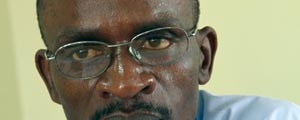
As I was writing this instalment at the weekend in the dying hours of United Nations climate negotiations, hundreds of campaigners occupied the conference centre halls in Doha, Qatar, to call on countries to “Reject the Text”. Opinion by Wisdom Mdzungairi
It appeared two weeks of negotiations were not all rosy as the final “Ministers” texts emerging were “A million miles from where we need to be to even have a small chance of preventing runaway climate change.”
It was clear that as the Doha talks lurched listlessly towards their close, hot air was just one of the outstanding issues unresolved. The others involved finance and compensation for damages caused by climate change.
No countries increased their emission cut targets at the Doha meeting. Africa demanded cuts of 40-50% by 2020 to have a chance of limiting temperature rise to no higher than 1,5˚C. Without this, environment campaigners claimed the world would face runaway climate change and far greater global temperature rises.
The Pan African Climate Alliance’s Mithika Mwenda said: “Our message to the world is build the transformation of our food and energy systems in every country; deliver real national emissions cuts and build a global climate justice movement that will hold world leaders accountable to their citizens and not the polluters.”
LIdy Nacpil of Jubilee South Asia Pacific which is currently experiencing devastation as a result of Typhoon Bopha said: “As civil society movements, we are saying that this is not acceptable. We cannot go back to our countries and tell them that we allowed this to happen, that we condemned our own future. We cannot go back to the Philippines, to our dead, to our homeless, to our outrage, and tell them that we accepted this.”
The campaigners put the blame for failure squarely on the shoulders rich industrialised countries, such as the United States, Canada and Japan, who have refused to sign up to deep climate pollution cuts and outrightly rejected a new commitment period of the Kyoto Protocol.
A compromise was still not enough to satisfy developing countries who wanted hot air permits scrapped altogether.
- Chamisa under fire over US$120K donation
- Mavhunga puts DeMbare into Chibuku quarterfinals
- Pension funds bet on Cabora Bassa oilfields
- Councils defy govt fire tender directive
Keep Reading
In a frosty exchange, the Qatari president of the talks Abdullah bin Hamad al-Attiyah was asked by the EU representative to break up the plenary session to allow countries to sort out disputes in small groups.
The Doha talks represented the hinge point between the existing UN system — the 15-year-old Kyoto Protocol — and a future system to be settled by 2015.
And as politicians delayed, scientists continued to warn of ever-increasing greenhouse gases, while questions were raised as to whether religion had a role in the war on climate change. Some believed that people of all faiths could make a difference as the world faces turbulent change.
According to an inter-faith panel of religious figures at COP 18, the power of prayer and ethical behaviour are vital tools in the fight against climate change.
Several senior representatives of different religions discussed how faith in God can contribute to the climate change conference at a side event organised by the World Council of Churches (WCC).
The “Ethical and Religious Insights on the Climate Crisis” began with a short film that the WCC made in Tuvalu, a small island state in the Pacific that could be wiped out if sea levels continue to rise.
One of the islanders described the issues his country is facing today, including the death of fish stocks and destruction of coral that acts as a barrier against coastal erosion from the sea.
Despite the threat of climate change to their country, the film showed that much of the population retains its faith in God and are optimistic about their fate. They just need the rest of the world to agree ways to dramatically reduce carbon emissions.
After the film, the event heard from Jayanti Kirpalani from the Brahma Kumaris World Spiritual University — Europe, who partly blamed climate change on the fact that much of the world population had rejected spirituality and the importance of the soul.
“As a result there is no respect for other forms of life,” she said, adding that through prayer, “it is possible to heal nature and reverse the process of damage that we have been responsible for”.
Archbishop Seraphim Kykotis of Zimbabwe and Angola said that all religions and followers of religions had a duty to lead sustainable lifestyles.
“I want to emphasise that most religions in their sacred texts uphold the need to care for creation.”
So unless and until humanity achieves an ethical stance that recognises the intrinsic value of nature, all our efforts may well end in failure.










